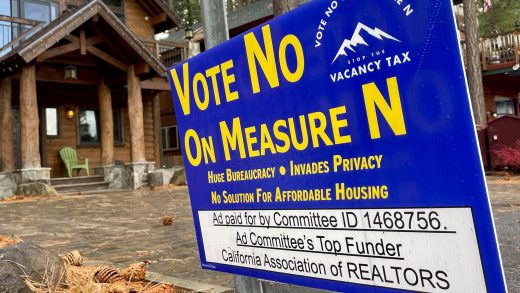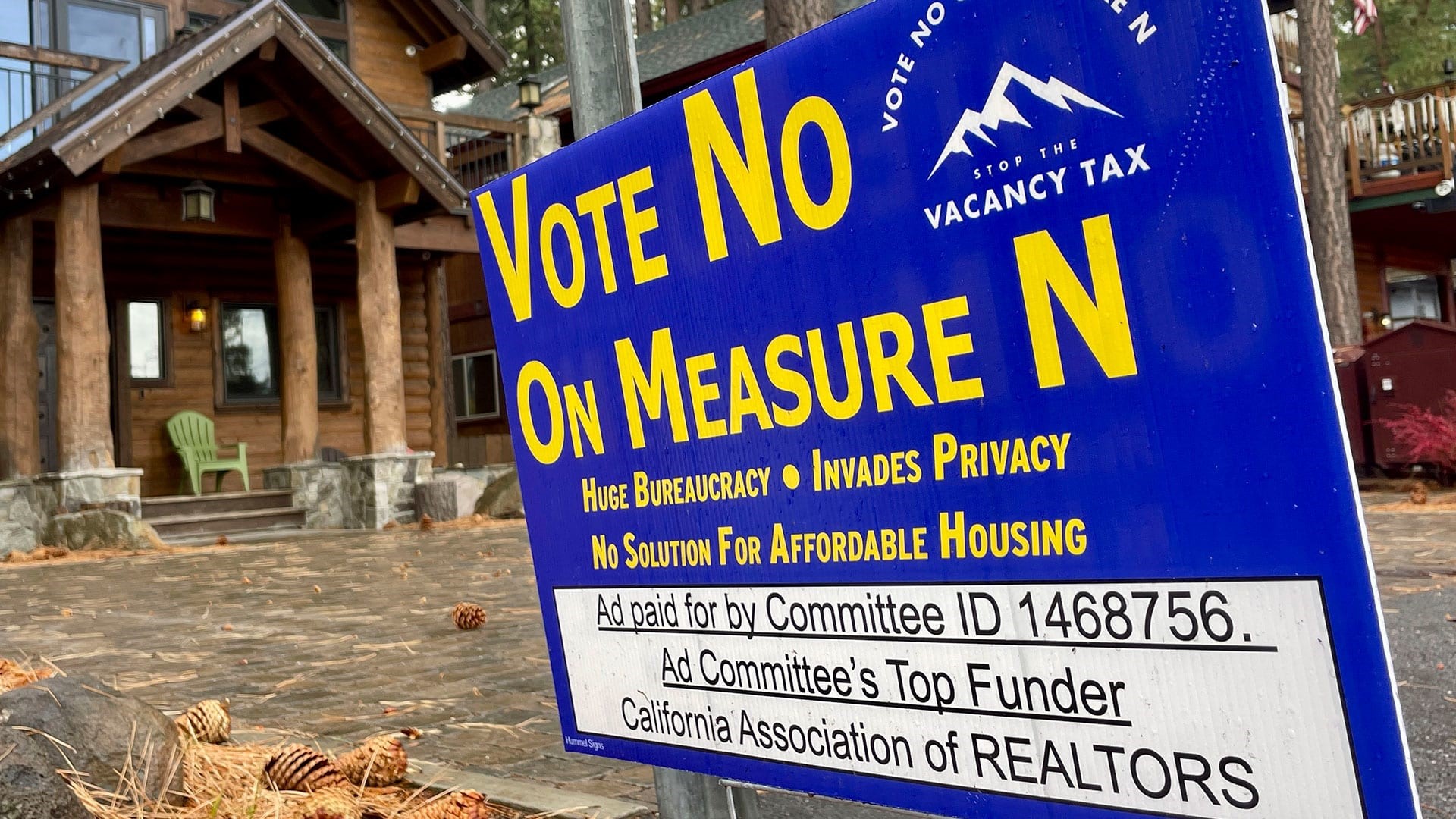California’s affordable housing issue in the spotlight with Tahoe vacation homes tax
California’s affordable housing issue in the spotlight with Tahoe vacation homes tax
South Lake Tahoe has about 7,000 vacant homes—44% of the city’s estimated housing units.
Owners of vacation homes in Northern California’s South Lake Tahoe could face a significant tax increase if voters in the mountain resort town approve a measure on Tuesday’s ballot that pits affordable housing against private property rights.
South Lake Tahoe, which sits on the shores of the iconic alpine lake, has about 7,000 vacant homes—44% of the city’s estimated housing units—according to the 2022 American Community Survey. Measure N would levy a flat $3,000 tax on homes that are vacant 182 days within a calendar year.
The tax would increase to $6,000 for every subsequent year the home remains empty for half the year.
The town is the latest across the United States with a growing debate about the impact of vacation properties. Critics say vacant second homes have worsened the nation’s housing crisis by contributing to a shortage of affordable rental properties, especially in pricey resort places like South Lake Tahoe.
Supporters of the measure say they want to encourage homeowners to rent to workers or pay into a fund for housing, roads, and transportation projects. They say the city is shedding families as businesses struggle to hire staff in a region with little land available for housing development.
Kelly Bessem works at least 50 hours a week at multiple jobs as a hydrology and land management field scientist and a snowboard instructor. She’s currently sleeping in her car to buy a house in Markleeville, which is a 40-minute drive to South Lake Tahoe.
“I’ve done all the things I’m supposed to, but it’s still to the point where I just squeeze by,” Bessem said.
Nancy Dunn, a homeowner who has lived part-time in South Lake Tahoe since 2018, opposes the measure as unfair and un-American.
“This is my home, and I want to be able to come back to it when I want to, and come and go as I feel,” Dunn said as she stocked her house with firewood earlier this month. “The American way is to have the right to own property, and to do with it as you please.”
The California Association of Realtors and the National Association of Realtors have contributed a combined $1 million to defeat the measure in a town with only 12,000 registered voters.
While still rare in the U.S., more places are considering an empty homes or vacant homes tax to address workforce housing shortages by tapping underused homes to expand the long-term rental market.
In Hawaii, the Honolulu City Council is trying to pass an empty homes tax, its third attempt since 2018, while the Colorado Association of Ski Towns is seeking legislation allowing cities and counties to ask voters to approve vacant homes taxes.
Margaret Bowes, the Colorado group’s executive director, said resort towns have few options in where they can build. The lack of housing “has reached a crisis level” affecting basic services and commerce “from ski resort companies to local, small businesses,” she said.
Perhaps the best known example is Vancouver, Canada, which in 2017 imposed a 1% tax on an empty home’s assessed taxable value. The tax is now 3% and the city says it has generated $142 million for affordable housing projects.
In California, San Francisco and Berkeley approved taxes on vacant properties in 2022.
Vacancy taxes can work to a limited degree in larger cities, but an empty homes tax could make a huge difference in smaller towns like South Lake Tahoe, said Shane Phillips, who manages the Randall Lewis Housing Initiative at the University of California, Los Angeles.
He did not know enough about the proposed tax to weigh in, but generally supports vacancy taxes on vacation homes in regions where housing is short. Taxes can be used to discourage harmful behavior, he said, such as taxes on cigarettes.
“And I think there’s a similar argument to be made here, that people consuming multiple homes and not living in them in communities like South Lake Tahoe . . . it’s actually doing harm to other people,” Phillips said.
Measure N has roiled the tiny community, which with about 21,000 year-round residents is the most populous city ringing Lake Tahoe and a popular weekend destination. It is 188 miles (300 kilometers) northeast of San Francisco.
The city has a median household income of $68,000, lower than the $95,000 median in California. The median sales price of a home was $750,000 in September—up from $427,000 five years ago, according to Redfin.
Modeled on Berkeley’s empty homes tax, the city projects that the proposed tax will raise up to $8 million in its first year and up to $20 million a year afterwards.
Amelia Richmond, cofounder of Locals for Affordable Housing, the group that collected the signatures to get the issue on the ballot, said it is an opportunity to ensure South Lake Tahoe does not go the way of other mountain towns with even higher vacancy rates.
Property owners would self-report each year, although documentation may be required. There are exceptions to the occupancy requirement, such as homes undergoing renovation.
To avoid the tax, owners of vacation homes could sell their property, lease to a tenant year-round, or rent to seasonal travelers or workers. They can’t list their homes as short-term rentals after the city voted to curtail rentals of fewer than 30 days, citing noise and the housing shortage.
Opponents say many of them scrimped and saved for modest second homes and they shouldn’t be punished for the region’s lack of affordable housing. They’re also upset because as part-time residents, they cannot vote on the measure.
Tom Fields, 85, splits his time between a three-bedroom house that he describes as nothing special other than its location on Lake Tahoe and a place in central Oregon.
“This is crazy and I don’t even know if it’s constitutional,” he said. “When you purchase the land and they start taking away rights, that’s when people get upset.”
—-
Har reported from San Francisco.
—Haven Daley and Janie Har, Associated Press
(5)



